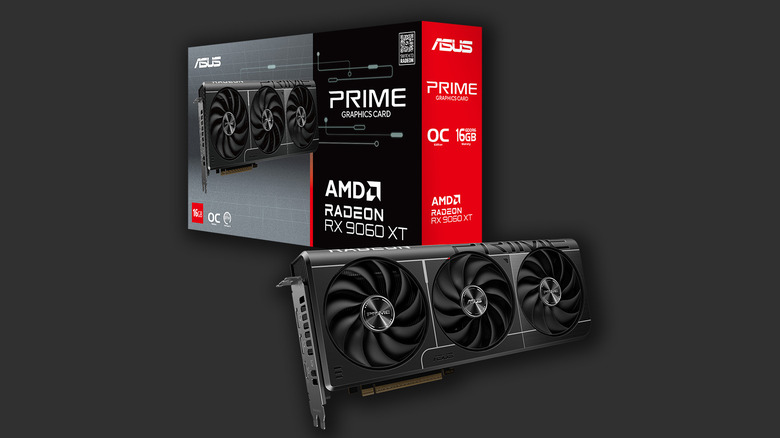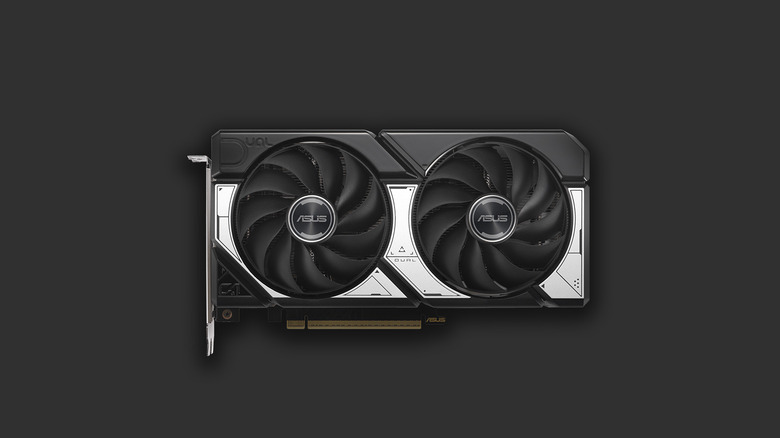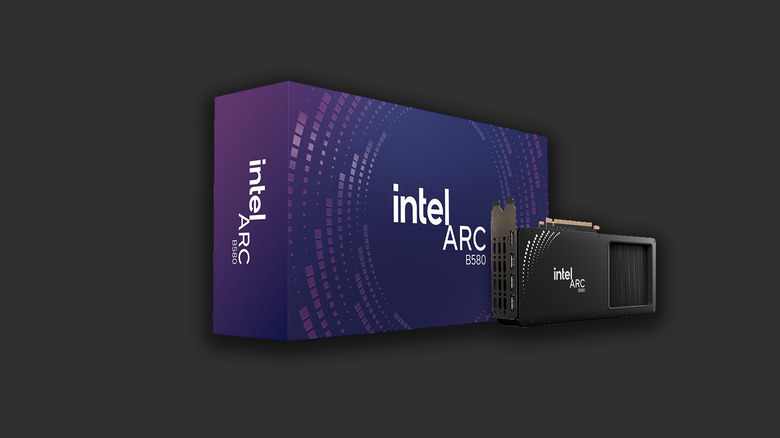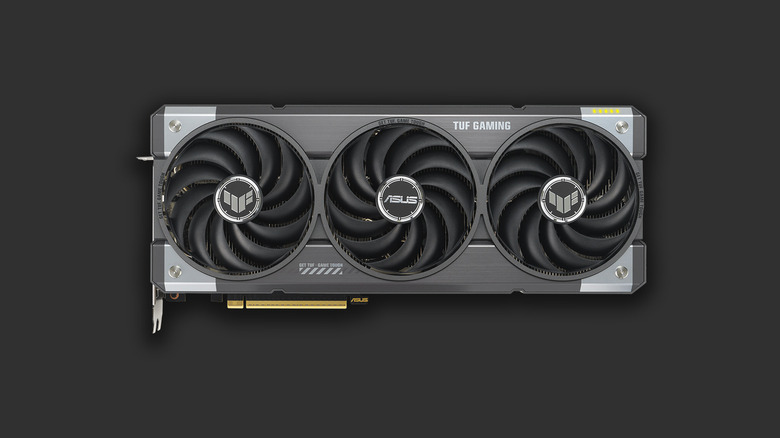3 Alternatives To The AMD RX 9060 XT That You Can Buy Today
When scoping out and comparing components for your next gaming PC, it's easy to get lost in the premium range that features some of the most powerful graphics cards money can buy. With a virtually unlimited budget, 4K gaming at high frame rates is what's achievable — but not everyone is willing to blow thousands of dollars on a GPU. Thankfully, the mid-range selection of graphics cards has gotten a lot more competitive in recent years.
AMD's Radeon RX 9060 XT was unveiled at Computex 2025 following the success of the higher-end RX 9070 XT. The new GPU starts at an MSRP of $299 — but that's for the 8GB VRAM version. There also exists an RX 9060 XT with 16GB of VRAM, which is the one that most gamers should be eyeing, given how resource-intensive recent titles have gotten.
Both graphics cards are based on the new RDNA 4 architecture and pack in AMD's latest FSR 4 (FidelityFX Super Resolution) and Fluid Motion Frames, two technologies that noticeably improve gaming performance under the right conditions. The 16GB RX 9060 XT, priced at $349, offers an excellent value, as long as you can find it for the same price.
If you've been eyeing alternatives, perhaps something built by Team Green, there are a few compelling options that rival AMD's Radeon RX 9060 XT. We've based this list on expert reviews, and you can find more about our methodology at the end of this read.
Nvidia RTX 5060 Ti: The closest competitor
The RTX 5060 Ti was unveiled in April 2025 by Nvidia, and like the Radeon RX 9060 XT, it comes in both 8GB and 16GB VRAM variants — priced at $379 and $429, respectively. This puts both models at a higher price point than the RX 9060 XT, but the RTX 5060 Ti does come with slight performance improvements. The 16GB VRAM version, specifically, is ideal for running the latest games at maxed out graphics at 1080p, while still managing playable frame rates at 1440p.
The RTX 5060 Ti is built on top of Nvidia's Blackwell microarchitecture and brings with it features like Nvidia DLSS and Multi Frame Generation (MFG). The general consensus among gamers and experts in the PC gaming industry is that Nvidia's GPUs are noticeably better in both performance and reliability compared to AMD's options when it comes to running productivity apps. This is one of the only solid reasons to chip in a little extra to grab a current-gen RTX GPU.
You also get more promising results with ray tracing turned on. Tom's Hardware conducted an in-depth review where the RTX 5060 Ti averaged 112 FPS in a 1080p medium preset ray tracing test. Overall, the RTX 5060 Ti is a beefier graphics card and may be worth the extra $80 — assuming you can grab one at MSRP.
Intel Arc B580: Excellent budget 1440p GPU
It might surprise many that Intel has entered the GPU race — what may be more surprising is the fact that its second-generation Battlemage GPUs have been really solid so far. The Intel Arc B580 is one of the most affordable entries into 1440p gaming, and if you manage to find it at its MSRP of $249, it's pretty much a no-brainer. We had it ranked as one of the best GPUs you can buy under $300.
It's worth noting that the Intel Arc B580 is a fair way behind the Radeon RX 9060 XT 16GB, but is a great recommendation nevertheless, thanks to its affordable price point and the fact that it still ships with more VRAM (12GB) than the base RX 9060 XT (8GB). If 1440p gaming is anywhere on your radar, then the Intel Arc B580 slots right between the two RX 9060 XT GPUs, and doesn't suffer from nearly the same fate as being always out of stock or being significantly marked up in price as Nvidia's and AMD's GPUs.
TechRadar reviewed the graphics card in great detail, giving it a full 5/5 score. Across several benchmarks, the Intel Arc B580 consistently beat the costlier RTX 4060 and RX 7600 XT GPUs. That said, comparing Intel GPUs to Nvidia and AMD's offerings, the Arc B580 lags a touch behind when it comes to AI features or creative work.
Nvidia RTX 5070: A notch up
We've looked at options both equal and lower in price and performance to the Radeon RX 9060 XT — but what if you're looking to future-proof your build with a slightly better GPU? Nvidia's own RTX 5070 is a current-gen option that fits this requirement. At an MSRP of $549, it is considerably more expensive than either of the RX 9060 XT variants — but with this option, you are looking at a no-compromise 1440p gaming experience at excellent frame rates.
Like the RTX 5060 Ti, a major reason to want to pick the RTX 5070 over an equivalent AMD card is for features like DLSS 4 and improved performance in ray tracing. It does come with less physical VRAM at 12GB, but the card is capable of 1440p gaming, as mentioned in TechPowerUp's review, which also placed its performance between the RX 7900 XT and RX 9070 XT — being quite comparable to the regular RX 9070.
Like most new Nvidia and AMD graphics cards, unfortunately, you are unlikely to snatch an RTX 5070 at its advertised retail price of $550 — but as long as the difference in price stays proportional, you are seeing a noticeable performance jump with this GPU coming from the Radeon RX 9060 XT. Plus, if you value ray tracing performance and overall better stability with creative applications that aren't games, the RTX 5070 is a good current-gen buy.
Why we've picked these graphics cards
Shopping for a brand-new GPU in 2025 isn't for the weak — even if you manage to find one in stock, you'd be hard-pressed to pay anywhere close to its advertised MSRP. The Radeon RX 9060 XT 16GB is a great recommendation for those looking to build an upper mid-end gaming PC, capable of 1080p or 1440p gaming.
Reasons to gravitate towards alternatives from Nvidia, like the similarly priced RTX 5060 Ti or the beefier RTX 5070, include better ray tracing performance, proven DLSS and frame generation results, and wider compatibility across professional GPU-intensive applications. There's always the option to shop in the used marketplace, which actually yields more bang for your buck most of the time. Previous generation picks like the RTX 4070 Super are still highly capable 1440p GPUs and can be excellent alternatives to current-gen midrange cards.
For this list, we referred to reputable publications such as Tom's Hardware, TechRadar, and TechPowerUp — which are all sources that conduct in-depth testing of computer parts, including GPUs. It's also imperative that you buy compatible parts when upgrading your PC to avoid component mismatch or bottleneck issues.




